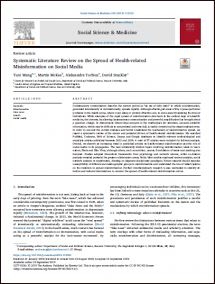Systematic Literature Review on the Spread of Health-related Misinformation on Social Media
In order to uncover the current evidence and better understand the mechanism of misinformation spread, the authors report a systematic review of the nature and potential drivers of health-related misinformation.
A total of 57 articles were included for full-text analysis.Overall, they observed an increasing trend in published articles on health-related misinformation and the role of social media in its propagation. The most extensively studied topics involving misinformation relate to vaccination,Ebola and Zika Virus, although others, such as nutrition, cancer, fluoridation of water and smoking also featured. Studies adopted theoretical frameworks from psychology and network science, while co-citation analysis revealed potential for greater collaboration across fields.
They found that since the persistence of misinformation owes both to the psychological responses and to the social contexts under which misinformation spread, potential interventions should target both fronts.
At the individual level, although interventions to correct misperceptions are proven effective at times, efforts to retract misinformation need to be carried out with caution in order to prevent backfiring. This requires profound understanding on how epistemic and ideology beliefs act as obstacles to accepting scientific evidence. A more constructive approach may be to cultivate critical thinking and to improve health and media literacy, thereby equipping individuals with the faculty to critically assess the credibility of information.
At the system level, how can amend the information ecosystem be amended to reduce selective exposure and opinion polarization is not a challenge for academics and policy-makers alone to face. They therefore hope that this review can stimulate social scientists, psychologists, computer scientist and medical professionals to not only collaborate with each other, but also engage with industries and internet consumers to understand and counter the effects of this increasingly important social phenomenon.
Social Science & Medicine 240 (2019) 112552
Authors:
Yuxi Wang a,∗, Martin McKee b, Aleksandra Torbica a, David Stuckler c
a Centre for Research on Health and Social Care, Department of Social and Political Science, Bocconi University, Italy
b London School of Hygiene and Tropical Medicine, United Kingdom
c Department of Social and Political Science, Bocconi University, Italy
Last modified: July 21, 2020
Language: English

